李观仪新编英语教程第六册unit 10 straight-A illiteracy
新编英语教程6_答案_李观仪
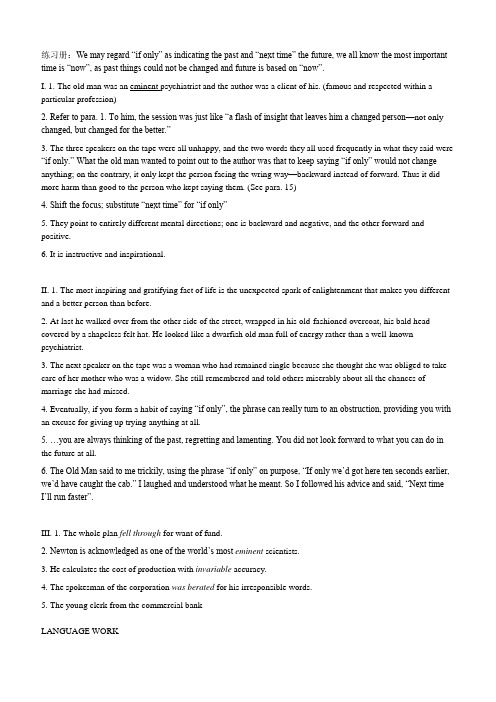
练习册:We may regard “if only” as indicating the past and “next time” the future, we all know the most important time is “now”, as past things could not be changed and future is based on “now”.I. 1. The old man was an eminent psychiatrist and the author was a client of his. (famous and respected within a particular profession)2. Refer to para. 1. To him, the session was just like “a flash of insight that leaves him a changed person—not only changed, but changed for the better.”3. The three speakers on the tape were all unhappy, and the two words they all used frequently in what they said were “if only.” What the old man wanted to point out to the author was that to keep saying “if only” would not change anything; on the contrary, it only kept the person facing the wring way—backward instead of forward. Thus it did more harm than good to the person who kept saying them. (See para. 15)4. Shift the focus; substitute “next time” for “if only”5. They point to entirely different mental directions; one is backward and negative, and the other forward and positive.6. It is instructive and inspirational.II. 1. The most inspiring and gratifying fact of life is the unexpected spark of enlightenment that makes you different and a better person than before.2. At last he walked over from the other side of the street, wrapped in his old-fashioned overcoat, his bald head covered by a shapeless felt hat. He looked like a dwarfish old man full of energy rather than a well-known psychiatrist.3. The next speaker on the tape was a woman who had remained single because she thought she was obliged to take care of her mother who was a widow. She still remembered and told others miserably about all the chances of marriage she had missed.4. Eventually, if you form a habit of say ing “if only”, the phrase can really turn to an obstruction, providing you with an excuse for giving up trying anything at all.5. …you are always thinking of the past, regretting and lamenting. You did not look forward to what you can do in the future at all.6. The Old Man said to me trickily, using the phrase “if only” on purpose, “If only we’d got here ten seconds earlier, we’d have caught the cab.” I laughed and understood what he meant. So I followed his advice and said, “Next time I’ll run faster”.III. 1. The whole plan fell through for want of fund.2. Newton is acknowledged as one of the world’s most eminent scientists.3. He calculates the cost of production with invariable accuracy.4. The spokesman of the corporation was berated for his irresponsible words.5. The young clerk from the commercial bankLANGUAGE WORKI. 1. C 2. C 3. D 4. B 5. C 6. A 7. D 8. A 9. D 10. B 11. A 12. B 13. C 14. D15. A 16. B 17. B 18. A 19. A 20. DIII. 1. predominantly, prevailing 2. preferential 3. tremulous 4. inadvisable, shrinkage 5. sensitive, terrorism/terror6. magnifying7. unapproachable, fictitious8. unbecoming/becoming9. unaccountable 10. disorientation 11. persuasion, entreaties 12. irremediableIV. 1. blame 2. reproached 3. blamed/reproached 4. reproached5. rebuke/reprimand6. reprimanded7. rebuke/scold/reprimand8. reprimanded9. reprimanded 10. scolded 11. reproach 12. scoldedV. 1. on 2. In 3. over 4. in 5. from 6. beneath 7. with 8. in 9. of 10. Since 11. to 12. in 13. with 14. with 15. between 16. with 17. to 18. In 19. on 20. In 21. to 22. on 23. in 24. likeVI. 1. ash 2. outbreaks 3. interval 4. eruption 5. volcanologist 6. which 7. lava 8. cone 9. flood 10. under 11. crater 12. began 13. cauliflower 14. like 15. andUnit TwoTEXT ITHE FINE ART OF PUTTING THINGS OFF未修订前的练习答案:I. Paraphrase the parts underlined in the following:“Never put off till tomorrow,” 1exhorted Lord Chesterfield in 1749, “what you can do today.”’ That the elegant earl never 2got around to marrying his son’s mother an d had a bad habit of keeping 3worthies like Dr. Johnson cooling their heels for hours in an anteroom 4attests to the fact that even the most well-intentioned men have been postponers ever. Quintus Fabius Maximus, one of the great Roman generals, was 5dubbed “Cunctator” (Delayer) for putting off battle 6until the last possible vinum break. Moses 7pleaded a speech defect to rationalize his reluctance to deliver Jehovah’s edict to Pharaoh. Hamlet, of course, raised procrastination to an art form.There are those who prepare their income taxes in February, prepay mortgages and serve precisely planned dinners at an 8ungodly 6: 30 p.m. The other half dine happily on leftovers at 9 or 10, misplace bills and 9file for an extension of the income tax deadline. They seldom pay credit-card bills until the 10apocalyptic voice of Diners threatens doom from Denver. They postpone, 11as Faustian encounters) visits to barbershop, dentist or doctor.Yet 12for all the trouble procrastination may incur, delay can often inspire and revive a creative soul.From Cunctator’ s day until this century, the art of postponement had been 13virtually a monopoly of the military (“Hurry up and wait”), diplomacy and the law. In former times, a British proconsul faced with a native uprising could comfortably 14ruminate about the situation with Singapore Sling” in hand. 15Blessedly, he had no flattering Telex to order in machine guns and fresh troops.Even 16where there is no will, there is a way. There is a difference, of course, between chronic procrastination and purposeful postponement, particularly 17in the higher echelons of business.The data explosion 18fortifies those seeking excuses for inaction —another report to be read, another authority to be consulted.His point is well 19taken. 20Bureaucratization, which flourished amid the growing burdens of government and the greater complexity of society, was designed to smother policymakers in blankets of legalism, compromise and reappraisal --- and thereby prevent hasty decisions from being made.Many languages are 21studded with phrases that refer to putting things off ---from the Spanish maiana to the Arabic bukrafil mishmish.There are all sorts of 22rationalizations: the pressure of teaching responsibilities at home, checking out the latest book, looking up another footnote.”To Georgia State Psychologist Joen Fagan, however; procrastination may be a kind of 23subliminal way of sorting the important from the trivial.It is something of 24a truism that to put off making a decision is itself a decision. The parliamentary process is essentially a system of delay and deliberation. So, 25for that matter, is the creation of a great painting, or 26an entree, or a book, or a building like Blenheim Palace, which took the Duke of Marlborough’s archite cts and laborers 15 years to construct. In the process, the design can 27mellow and marinate.In other words, 28pace Lord Chesterfield, what you don’t necessarily have to do today, by all means put off until tomorrow.I. Paraphrase1. exhorted: urged strongly2. the elegant earl never got around to marrying his son's mother: found time for3. a habit of keeping worthies like Dr. Johnson cooling their heels for hours: men of importance like Dr. Johnson waiting4. That.…attests to the fact that: proves5. one of the great Roman generals was dubbed "Cunctator": named humorously6. for putting off battle until the last possible vinum break: until an effective defense deserving a celebration with champagne was ensureda speech defect, and that he had reasons for8. at an ungodly 6:30 p.m.: unreasonable9. to file for an extension of the income tax deadline: apply officially10.until the apocalyptic voice of Diners threatens doom from Denver: warning, suggests unavoidable destruction11.They postpone, as Faustian encounters, visits to barbershop: as if they will see devils13.the art of postponement had been virtually a monopoly of the military, diplomacy and the law: found almost only in the field of14.to ruminate about the situation with Singapore Sling in hand: go over in mind repeatedly and slowly15.Blessedly, he had no nattering Telex to order machine guns and fresh troops: fortunately, noisy16.Even there is no will, there is a way: there is no will to delay, there is a way to do so.17.in the higher echelons of business: in the case of higher levels18.The data explosion fortifies those seeking excuses for inaction: encourages, doing nothing19.His point is will taken: accepteddeveloped very quickly as a result of the expanding administrative structure and the greater complexity of society, were made to restrict policymakers, who have to be engaged in endless paperwork, mediation and reconsideration21.Many languages are studded with phrases that refer to putting things off: filled22.There are all sorts of rationalizations: reasons23.a kind of subliminal way of sorting the important from the trivial: way outside one's conscious awareness24.It is something of a truism: an undoubted truth25.for that matter: as further concerns the thing mentioned26.So…is the creation of an entree: a small carefully prepared meat dish27.the design can mellow and marinate: ripen and mature28.pace Lord Chesterfield: with all due respect toII. Rewrite the followingFor each of the sentences below, write a new sentence as close in meaning as possible to the original sentence by using the given words as the beginning.1. That the elegant earl never got around to marrying his son’s mother and had a bad habit of keeping worthies like Dr. Johnson cooling their heels for hours in an anteroom attests to the fact that even the most well-intentioned men have been postponers ever.The fact that even the most well-intentioned men have been postponers ever can be testified ___ by the elegant earl who never got around to marrying his son’s mother and had a bad habit of keeping worthies like Dr. Johnson cooling their heels for hours in an anteroom.2. Moses pleaded a speech defect to rationalize his reluctance to deliver Jehovah’s edict to Pharaoh.By saying that he had a speech defect, Moses rationalized his reluctance to deliver Jehovah’s edict to Pharaoh.3. Yet for all the trouble procrastination may incur, delay can often inspire and revive a creative soul.Although procrastination may incur, delay can, yet, often inspire and revive a creative soul.4. Bureaucratization, which flourished amid the growing burdens of government and the greater complexity of society, was designed to smother the policy-makers in blankets of legalism, compromise and reappraisal.The design of bureaucratization, which flourished amid the growing burdens of government and the greater complexity of society, was to smoother the policy-makers in blankets of legalism, compromise and reappraisal.5. There is a long and honorable history of procrastination to suggest that many ideas and decisions may well improve if postponed.Procrastination has been honored long, suggesting that many ideas and decisions may well improve if postponed.III. Translate the following into English1.事实上,拖延这种现象的漫长而骄人的历史本身就已经表明,许多构想和决定如果加以推迟可能会更为圆满。
李观仪新编英语教程第六册翻译

1 由于缺少资金,整个计划失败了The whole plan fell through for want of fund.2 牛顿被公认为是世界最杰出的科学家之一。
Newton is actnowledged as one of the world;s most eminent scientists.3 他对生产成本的估算总是准确无误He calcuates the cost of production with invariable accuracy4 公司发言人的不负责任的讲话受到了严厉的指责The spokesman of the corporation was berated for his irresponsible words.5 这名商业银行的年轻职员看出那张十英镑的假币The young clerk from the commercial bank soitted thecorinterfeit ten-pound note.6 这个精干的经理立刻行动起来The efficient manager acted promptly7 请把候补名单上她的名字换成你的名字Pleasure replace her name for yours on the waiting list8 她觉得她在当地综合医院任实习医师是一段宝贵的经历Shen found that her internship in the local general hospital was a rewarding experience9 不要感叹过去得不幸,振作起来行前看Don't lament your past misfortunes., keep your shin up and look to the future 1 富兰克林在他的自传里力劝读者要勤俭Franklin exhorted readers to be diligent and thrifty in his Autobiography.2.谁能证实这签名无讹Who can attest to the genuineness of the signature?3. 人们给它起了小家伙的绰号。
(NEW)李观仪《新编英语教程(6)》(第3版)学习指南【词汇短语+课文精解+全文翻译+练习答案】
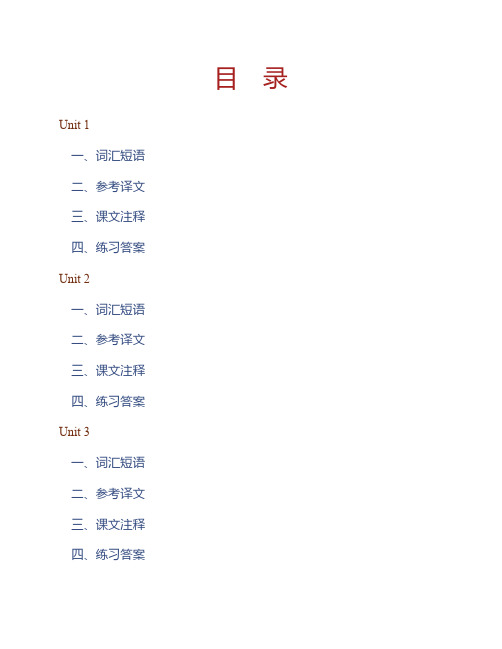
34. cardboard [5kB:dbC:d] n. thick, stiff paper that is used, for example, to make boxes and models 硬纸板
35. bitterly [5bitEli] adj. very; violently 强烈地;非常 bitterly upset 极其难 过
24. perverse [pE(:)5vE:s] adj. Directed away from what is right or good; perverted. (行为)任性的,蛮不讲理的 e.g. She was perversely pleased to be causing trouble. 她制造麻烦,还乐在其中,真是反常。
14. long since—long ago很久以前
15. cease [si:s] v. come or bring (sth.) to an end; stop停止,中止
16. at some length—in some detail详细地
17. melancholy [5melEnkEli] adj. very sad; depressed悲哀的;沮丧的; n. 忧郁;悲哀;愁思(sadness , doldrums)e.g. Melancholy is the preponderant mood of the poem. 忧郁的感情是该诗的基调。
的,专注的;e.g. She looked from one intent face to another. 她看着一张 张专注的面孔。 adj. 坚决的;e.g. The rebels are obviously intent on keeping up the pressure.反叛分子显然决心继续施加压力。 n. 意图,目 的;But it is our intent that they learn something. 但是我们的目的就是让他 们学到东西。
李观仪新编英语教程第六册unit 9a red light for scofflaws

the bear: the Soviet Union the dragon : the Chinese (a fight between the bear and the dragon) c. Parts of the body heart: feelings and emotions head, brain: wisdom, intelligence, reason grey hair: old age d. Profession: the press: newspapers, reporters etc. He met the press yesterday evening at the Grand Hotel. the bar: the legal profession e. location of government, business etc. Downing Street: the British Government the White House: the US president and his government the Capital Hill: US Congress Wall Street: US financial circles Hollywood: American filmmaking industry
3
About the title
Traffic lights Red light: “stop” signals on roads; danger signals on railways; (fig) warning
4
Definition of SCOFFLAW: (chiefly U.S.) one who treats the law with contempt, especially a person who avoids various kinds of not easily enforceable laws常违反法规者、藐视法律者 Word formation: scoff (v., deride; ridicule irreverently) + law (n.) n. scofflawry 藐视法律的行为或实质
新编英语教程 6 Unit 10 教案
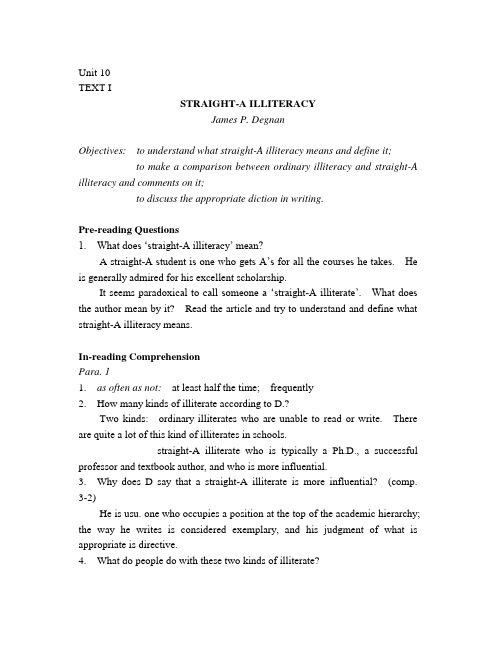
Unit 10TEXT ISTRAIGHT-A ILLITERACYJames P. DegnanObjectives: to understand what straight-A illiteracy means and define it;to make a comparison between ordinary illiteracy and straight-A illiteracy and comments on it;to discuss the appropriate diction in writing.Pre-reading Questions1. What does ‘straight-A illiteracy’ mean?A straight-A student is one who gets A’s for all the courses he takes. He is generally admired for his excellent scholarship.It seems paradoxi cal to call someone a ‘straight-A illiterate’. What does the author mean by it? Read the article and try to understand and define what straight-A illiteracy means.In-reading ComprehensionPara. 11. as often as not: at least half the time; frequently2. How many kinds of illiterate according to D.?Two kinds: ordinary illiterates who are unable to read or write. There are quite a lot of this kind of illiterates in schools.straight-A illiterate who is typically a Ph.D., a successful professor and textbook author, and who is more influential.3. Why does D say that a straight-A illiterate is more influential? (comp. 3-2)He is usu. one who occupies a position at the top of the academic hierarchy; the way he writes is considered exemplary, and his judgment of what is appropriate is directive.4. What do people do with these two kinds of illiterate?More concern has been shown for the ordinary illiterates. People even make fuss about this kind of illiteracy. However, little attention is aroused to straight-A illiterates. So, the purpose of this article is to give them as much attention as has been paid to ordinary illiterates. (ll. 6-7)Para. 21. What is this para. about?D’s treatment with a disease of straight-A illiteracy in his office.2. Do you think D’s comparison of straight-A illiteracy to a disease is appropriate? Explain. (comp. 3-3)Yes. Like a disease, it victimizes healthy persons; it has its symptoms, and its agents.3. Who is the straight-A illiterate?a college senior ... outstanding graduate schools.He is extremely clever and highly talented in language. He has done an excellent job in his studies, so he has been awarded an opportunity to further his study in one of the nation’s best graduate schools.4. How does the treatment go?They have been going over the student’s paper sentence by sentence, word by word for an hour, prying and probing for its meaning.‘Prying and probing’, the repetition of the same structure, is to emphasize the extreme difficulty of the task.5. Are there any other words to highlight the extreme difficulty in understanding Mr. Bright’s paper? (comp. 3-4)interrogating, cross-examining, pause to catch my breath, on earth, his brow furrowed, tries mightily, finally ... finally, another hour, decode ....6. Try to explain why the following pairs of sentences are the same in meaning: ll. 15-17, ll. 23 (comp. 3-8)As intended by the student, ‘The choice ... multi-colinearity’ corresponds to ‘demand’ while ‘... the derivations ... coefficients’ corresponds to ‘supply’.This is a very abstruse sentence to unravel.7. Why does D insert the word ‘allegorically’ in ‘... whom I call, allegorically,Mr. Bright’? (comp. 3-5)‘allegory’ in Lib. Work.When the author calls his student Mr. Bright allegorically, he does not mean to refer to this particular straight-A student only. He is using the term to cover all those students, college seniors, and Ph.D.’s who may seem bright when judged by their academic records, but who nevertheless fail to detect gibberish in their own writings or in those of others.The student given the name Mr. Bright thus becomes a symbol.Is he really bright? No, here in an ironical sense.Para. 31. It attacks best minds, ... in that of others.It does harm to the most intelligent individual and, by and by, wears away his ability to judge, eventually reducing him to being unable t Para. 3o detect nonsense either in his own writing or in that of others.This is the harm that straight-A illiteracy does to people.2. Reword the following sentences so that they are more easily understood: ll. 34-35, ll. 37-41 (comp. 3-9)ll. 34-35: The shop assistants had better have in stock what our customers need, or we won’t be in business long (=This is said or written by an ordinary illiterate, who is poor at spelling (them), pronunciation, punctuation, grammar (had + better, stock -up on, ain’t gonna be). So he makes many mistakes, and so he is kept out of institutions of higher learning. (l. 33)ll. 37-41: You must focus your attention on what your customers need so that you are able to tell what is necessary from what is unnecessary when you replenish your stock.This is written by a straight-A illiterate, who would never make spelling, grammar, punctuation mistakes, but who is incapable of making his ideas simple and clear in his writing. However, it is for writing this gibberish that he can be awarded straight As on his papers and the opportunity to continue his study, receiving higher and higher education until he has successfully got the Ph.D.The higher education one receives, the more serious his disease of straight-A illiteracy becomes. (ll. 27-28)3. Make complete the elliptical sentence ‘Not our man’. What is the function? (comp. 3-6)‘This is not what our man would say’. This ellipsis contrasts the two types of illiteracy, and with it D turns back from one type to the other.Para. 41. What is the major cause of straight-A illiteracy?the stuff - the textbooks and professional journals that the straight-A illiterate is forced to read during his years of higher education.He reads gibberish, and gradually he forms a habit of writing gibberish himself, which he has been instructed to learn an exemplary writing of sophisticated taste. (ll. 46-47)2. Give the examples of gibberish D quotes from professional journals.jargons as ‘ego-integrative action orientation’ and ‘orientation toward improvement of the graficational-deprivation balance of the actor’‘homologous’ or ‘isomorphic’, meaning ‘alike’‘allotropic’, meaning ‘different’‘dichotomize’ or ‘bifurcate’, meaning ‘divide anything3. D concludes his article by using quite a number of unintelligible words and expressions in place of clear and simple English. Is it effective? Why?This usual arrangement has undoubtedly enabled the reader once again to feel even more the absurdity of the practice to express simple ideas in an almost incomprehensible way, adding more weight to the point he intends to make. (Analysis)Post-reading Discussion1. Makeadefinition of ‘straight-A illiteracy’. (comp. 1-A)2. What is the purpose of D’s writing? (comp. 3-1)to find the cause of straight-A illiteracy.to give straight-A illiterate equal time with his widely publicizedcounterpart. (para. 1)to expose and condemn the use of professional jargon, which fills the reading materials that highly educated people are forced to read as they pursue their education. (Analysis)3. Comp. 24. Group work: Compare briefly the two types of illiteracy. Which type in your opinion presents a graver problem to society? (comp. 3-10)TEXT IITHE QUALITIES OF GOOD WRITINGJacqueline Berke1. This is an excerpt from Twenty Questions for the Writer, a widely used writing textbook, the kind of which we need to read to further our learning by ourselves. What do you usu. do when you read this kind of book by yourselves? Underline or highlight the important words or sentences, or make notes of your own so as to get the gist of it. Suppose you have borrowed this book from the library and come to read this part. What will you do with it? Study the text individually before class and do what you usu. do to catch the gist.2. Have group work for about 20 mins., exchanging what you have learned after reading it, and preparing for a presentation of this text. Your presentation can be based on Questions 1, 2, & 4 on p165.3. Presentation: Ask 4 groups to present the three qualities and human nature of writing respectively.4. As college seniors, we need to choose those more specific, exact, meaningful words in our writing rather than those common words as ‘good’, ‘nice’, etc. Do you consider using those more specific, exact, meaningful words as a kind of straight-A illiteracy? Give your opinions.。
新编英语教程6 unit 10
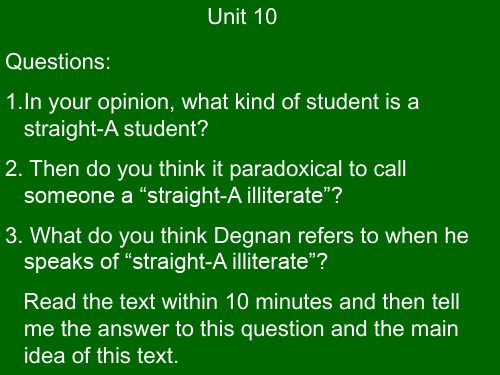
Possible answer to the 3rd question:
The title of the essay seem strange and even paradoxical to us. This special group of illiterate people includes straight-A students in college, Ph.D. candidates, and even certain highly successful professors. They are illiterate not in the ordinary sense of the word, but in the sense that they can not say or write in plain/ simple English. The reason, as the author argues, is to be found in the textbooks these straight-A students are forced to read through years of higher education, which are filled with professional jargons and gibberish writing.
a coveted fellowship: a fellowship (i.e. the money given to postgraduate students to allow them to continue their studies at an advanced level) that everyone longs jealously to possess. 5. allegorically: figuratively allegory: (1) an allegory is a form of imaginative literature constructed in such a way that their readers are encouraged to look for meanings hidden beneath the literal surface of the fiction. (Encyclopaedia Britannica) (2) An allegory is a narrative in which the characters, events, and setting represent deeper
新编英语教程4(李观仪)-练习册汉译英1-10单元
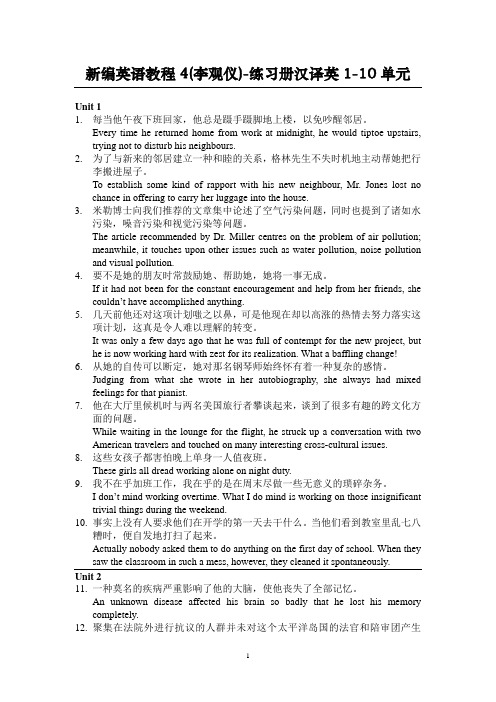
新编英语教程4(李观仪)-练习册汉译英1-10单元 Unit 11.每当他午夜下班回家,他总是蹑手蹑脚地上楼,以免吵醒邻居。
Every time he returned home from work at midnight, he would tiptoe upstairs, trying not to disturb his neighbours.2.为了与新来的邻居建立一种和睦的关系,格林先生不失时机地主动帮她把行李搬进屋子。
To establish some kind of rapport with his new neighbour, Mr. Jones lost no chance in offering to carry her luggage into the house.3.米勒博士向我们推荐的文章集中论述了空气污染问题,同时也提到了诸如水污染,噪音污染和视觉污染等问题。
The article recommended by Dr. Miller centres on the problem of air pollution;meanwhile, it touches upon other issues such as water pollution, noise pollution and visual pollution.4.要不是她的朋友时常鼓励她、帮助她,她将一事无成。
If it had not been for the constant encouragement and help from her friends, she couldn’t have accomplished anything.5.几天前他还对这项计划嗤之以鼻,可是他现在却以高涨的热情去努力落实这项计划,这真是令人难以理解的转变。
It was only a few days ago that he was full of contempt for the new project, but he is now working hard with zest for its realization. What a baffling change!6.从她的自传可以断定,她对那名钢琴师始终怀有着一种复杂的感情。
英语综合考研李观仪《新编英语教程6》考研复习指南
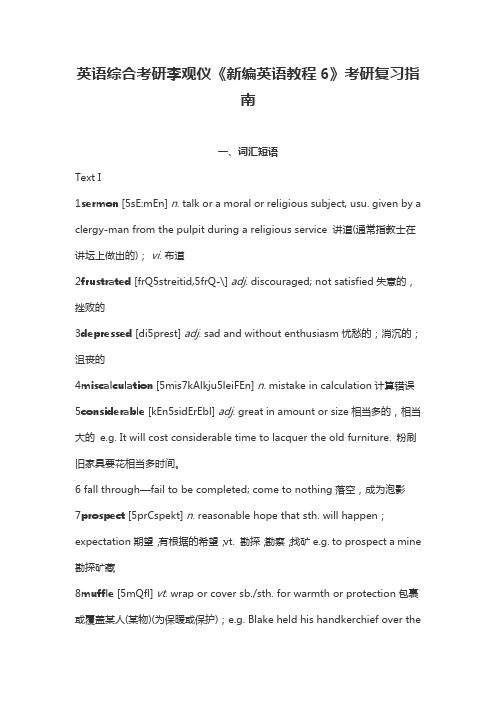
英语综合考研李观仪《新编英语教程6》考研复习指南一、词汇短语Text I1sermon [5sE:mEn] n. talk or a moral or religious subject, usu. given by a clergy-man from the pulpit during a religious service 讲道(通常指教士在讲坛上做出的);vi.布道2frustrated [frQ5streitid,5frQ-\] adj. discouraged; not satisfied失意的,挫败的3depressed [di5prest] adj. sad and without enthusiasm忧愁的;消沉的;沮丧的4miscalculation [5mis7kAlkju5leiFEn] n. mistake in calculation计算错误5considerable [kEn5sidErEbl] adj. great in amount or size相当多的,相当大的e.g. It will cost considerable time to lacquer the old furniture. 粉刷旧家具要花相当多时间。
6 fall through—fail to be completed; come to nothing落空,成为泡影7prospect [5prCspekt] n. reasonable hope that sth. will happen;expectation期望,有根据的希望;vt. 勘探;勘察;找矿e.g. to prospect a mine 勘探矿藏8muffle [5mQfl] vt. wrap or cover sb./sth. for warmth or protection包裹或覆盖某人(某物)(为保暖或保护);e.g. Blake held his handkerchief over themouthpiece to muffle his voice.布莱克用手帕遮住话筒来压低声音。
- 1、下载文档前请自行甄别文档内容的完整性,平台不提供额外的编辑、内容补充、找答案等附加服务。
- 2、"仅部分预览"的文档,不可在线预览部分如存在完整性等问题,可反馈申请退款(可完整预览的文档不适用该条件!)。
- 3、如文档侵犯您的权益,请联系客服反馈,我们会尽快为您处理(人工客服工作时间:9:00-18:30)。
6
The issue of illiteracy (widely publicized)
“Figures of 1998 show that 20% of the world population is illiterate ‖ from Wikipedia, the free encyclopedia ―Since 1983, more than 10 million Americans have reached the 12th grade without being able to read at a basic level. Over 20 million have reached their senior year unable to do basic math. Almost 25 million have reached 12th grade without knowing the essentials of U.S. history.‖
5
What kind of a person is an illiterate? Person 1). having little or no education; 2). Showing a lack of familiarity with language or literature; 3). Showing a lack of particular field of knowledge (musically illiterate)
4
Scan the following article and find out what is functional illiteracy, cultural illiteracy, and moral illiteracy. Three kinds of illiteracy 如何看待蒋海松机场吻别女友事件? 美国新泽西州纽瓦克国际机场因为一名中国博士为 了和女友吻别违规闯入警戒线,导致该美国机场关 闭6小时,数千人的行程被耽误。事发之后,这名叫 蒋海松的新泽西州罗格斯大学分子生物学联合项目 二十八岁的博士研究生被逮捕,并将受到非法闯入 罪名的起诉。(消息来源《广州日报》)
Straight-A Illiteracy
高分低能 ; 全A文盲
James P. Degnan
By Maggie
1
About the title straight
1.sick for five straight days; their fourth straight victory. (Uninterrupted; consecutive) 2. a straight answer. (Direct and candid) 3. The room is straight again. (Neatly arranged; orderly) 4. straight business dealings. (Showing or marked by honesty or fair-mindedness) 5. homosexual or straight (Heterosexual.) 6. Two straight whiskies, please. (Not mixed with anything else)
/popread/popread882.htm
How important is literacy?
--source: Illiterate America By Alan Caruba web posted February 5, 2001
7
目前全球共有约8亿文盲,主要分布在印度、中国、 印度尼西亚、巴基斯坦、巴西、尼日利亚、埃及等 国。中国文盲总数高居世界第二位,仅次于印度。 世界上每10个文盲中就有一个以上是中国人。中国 90%的文盲分布在农村,一半文盲在西部地区,文 盲中七成是女性。
2
illiteracy
illiterate illiterates literate literacy: Literacy is the ability to both read and write. 有读写能力
ห้องสมุดไป่ตู้
3
Illiteracy and Kinds of Illiteracy
In 1930 the U.S. Bureau of the Census defined as illiterate any person over ten years of age who was unable to read and write in any language. By the next census (1940), however, the concept of ―functional‖ illiteracy was adopted, and any person with less than five years of schooling was considered functionally illiterate, or unable to engage in social activities in which literacy is assumed. by 1970, the U.S. Office of Education considered at least six years of schooling (and sometimes as many as eight) to be the minimum criterion for functional literacy. This crisis of education is manifested in three levels of illiteracy: functional illiteracy, cultural illiteracy, and moral illiteracy.
